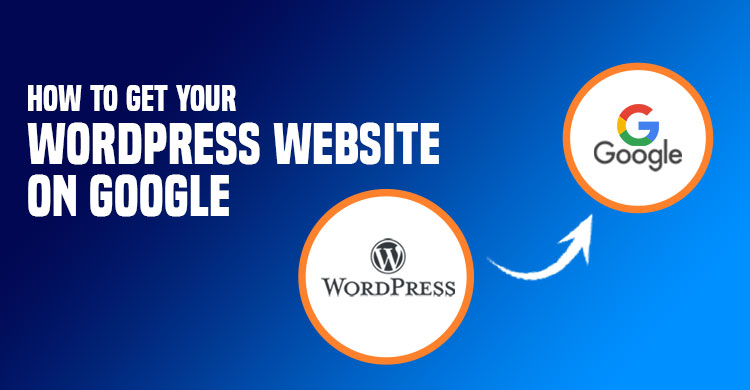How to Get Your WordPress Website on Google
Released - January 5th, 2023


Today we are going to be talking about how to get your WordPress website on Google. Once you create an awesome piece of content for your website, all you desire next is the new page appears on Google Search Result for greater audience engagement. Thus, your ultimate goal is to make sure the content is discovered and eventually ranked on the first page, perhaps on the first position, by the search engine giant. So, in this post, we will explore various ways you can attempt to get your WordPress website crawled and indexed by Googlebot.
Google is undoubtedly the greatest source of organic traffic for any WordPress website. If your website has not been indexed by Google yet, you most possibly are missing out on more than 90% of your potential audience. Established businesses, service providers, or any types of online venture rely largely on Google for their audience flow. Apart from the traffic flow, getting indexed on Google brings you lots of other conveniences such as trust and credibility, brand awareness, as well as popularity for your business or other initiatives. So, it is extremely essential that you get your WordPress website indexed on Google for a larger audience, increased revenue, and improved identity (authority) with added trust and credence.
The Google Search Engine Crawler, known as Googlebot, is constantly exploring (crawling) the web to find fresh (as well as updated) contents to get them listed on their Index. If your new WordPress content is accessible by the Bot (made crawlable by adopting essential SEO configurations) and the web page meets all the primary requirements to be eligible to get listed by Google, Google will index the New URL (to the fresh content) or the Old URL (to the updated content) to its library. So, it is essentially important that you establish a proper and convenient environment in your WordPress website and synchronize associated platforms for its pages and contents to be discovered and indexed by Google.
You will have to take some manual steps to get your WordPress website discovered by Google as well as some technical measures to get your updated or newly published contents indexed. However, you might find some tools or utilities (usually WordPress plugins) more convenient to do the job for you. Following are the comprehensive details of the required steps you want to take to get your WordPress website on Google.
Though important to remain check-marked during the development phase of your website, the WordPress setting is to be re-tweaked at the publication phase. When your WordPress website is quite well developed and ready with essential contents to go public, you should take care of this setting. Just go to Settings > Reading from your WordPress dashboard and uncheck “Disable search engines from indexing this site”. Do not forget to save the setting. This new setting will allow all the search engines including Google to index your WordPress contents.
Every WordPress website should have a robots.txt file (on the root directory of the domain) which is a great resource for setting roles and controlling the crawling of the search engine bots. Carefully notice how the Disallow and Allow roles are set for various agents and see if there is any role defined to block the Googlebot from crawling any important page. Just make sure you Disallow only the pages and directories that you do not want search engine bots (particularly, Googlebot) to crawl. Also, resubmit the updated robots.txt file to Google using Robots.txt Tester if you need to update the cache faster; although Google is supposed to automatically crawl the updated file in 24 hours. That is how you pave the way of getting your WordPress website on Google using a properly configured robots.txt file.
If you want to have essential data and insights regarding the performance of WordPress website, it is prudent to sign up for Google Search Console. The tool comes with extensive features and functionalities to run various types of tests, check for indexing errors, and manually submit individual pages etc. In fact, Google Search Console offers a playground with essential guidelines to learning how to get your WordPress website on Google.
Sitemaps are essential parts for WordPress websites to get on Google. In fact, your site map helps the Googlebot automatically find and index the new and updated contents. You can create or make use of related tools (WordPress plugins such as All in One SEO, Yoast SEO, and XML Sitemaps etc.) to generate sitemaps for your WordPress website and submit them using Google Search Console.
Fixing indexing errors is an inevitable part of the gradual process of getting your WordPress website on Google. You can find issues with individual web pages using Google URL Inspection Tool. Also, you can make use of Google Search Console (Indexing > Pages) to check for crawling and indexing issues of your WordPress website as a whole. The tool allows you to identify web pages tagged with Page with redirect, Not found (404), Soft 404, Blocked due to access forbidden (403), Crawled – currently not indexed, Discovered – currently not indexed, and various other terms so as to specifically find and resolve issues.
When you have resolved issues or think a web page is ready to be submitted again to get indexed, you can do so with the same Google Search Console tool. Just paste the currently not indexed URL in question into the URL Inspection search box and click on “Request Indexing”. The request will be processed in a while, and the page will be indexed soon if there are no more issues found. That is how you consequently get your WordPress website on Google utilizing various options offered by the Google Search Console.
You should also consider taking the following measures to accelerate the process of crawling and indexing for the Googlebotget and get your WordPress website on Google. Some measures are meant to remove the barriers while others let the crawlers know about the fresh contents and incite them to crawl and index faster. The measures include tweaking WordPress settings, synchronizing various Google platforms, integrating WordPress plugins, producing quality contents, and leveraging social networks etc.
If you have verified the ownership of both the www and non-www versions of your website and redirected one to the other, it’s always a good idea to set up your preferred domain in Google Search Console (Setting > Site Setting) to avoid the unnecessary presentation of indexing issues related to the non-preferred domain.
Setting up Google Analytics for your website will allow you to have overall information regarding the performance of your indexed web pages as well as essential insights into how to get other web pages of your WordPress website on Google.
You might want to utilize one or more powerful SEO plugins to eventually get your WordPress website on Google as they are meant to take care of various indexing and ranking issues.
Creating quality contents meeting necessary SEO requirements is one of the prerequisites for getting your WordPress website on Google.
Use Meta Tags for your contents wisely with the best SEO practice and check if there is any tag blocking your WordPress webpage from getting crawled or indexed.
Sharing your newly published or updated WordPress contents on various social networks is one of the most effective initiatives to get your WordPress website on Google.
Acquiring backlinks with appropriate anchor texts from reputed websites helps you get your website on Google in the most effective way as the backlinks make it easier for search engine bots to discover and index your contents.
Activities on Google Analytics, Search Consoles, and other Web Developer Tools keep your WordPress website constantly in connection with Google Search Engine and indirectly influence the crawling and indexing of your website contents.
Indeed, sticking to SEO best practices, utilizing effective WordPress plugins, and making proper use of developer tools (particularly, keeping track of your URLs on Google Search Console) are all you need to consider in order to successfully get your contents on Google. However, consistently posting fresh contents, having them linked back from external sources, and sharing them online are one of those fundamental ideas for inducing the Googlebot to crawl and index your web pages. Hopefully, by far, you have managed to have a clear idea about how to get your WordPress website on Google.